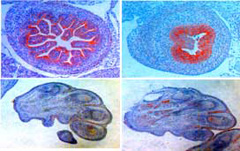Gene's Function in Regulating Body Size Helps Inform New Cancer Treatments
In a leading study that has implications for the development of novel therapies for a number of breast, lung and ovarian cancers that have lost the expression of a gene called glypican-3 (GPC3), Sunnybrook researchers have discovered how the loss of the GPC3 gene induces overgrowth through certain growth factors such as Sonic Hedgehog which stimulate cancer growth.
Published today in Developmental Cell, the study examines the molecular mechanism by which lack of functional GPC3 causes overgrowth in the Simpson-Golabi-Behmel syndrome (SGBS), a rare disorder that predisposes to cancers.
“This vital new finding at the molecular level opens doors for the development of novel treatments to inhibit overgrowth activity to benefit SGBS patients and the many breast, lung and ovarian cancer patients linked to loss of GPC3,” says Dr. Jorge Filmus, senior scientist, Division of Molecular and Cellular Biology, Sunnybrook Research Institute, and the study’s lead investigator. Early clinical trials presented at the last annual meeting of the American Association for Cancer Research in which cancer patients are being treated using Hedgehog-inhibitor drugs show promise.
GPC3 or glypican-3 is one of six genes of the glypican family. Glypicans are expressed predominantly during development in a stage and tissue specific manner suggesting they play a role in cell growth and in establishing the shape of tissues and organs.
This research was generously supported by the Canadian Institutes of Health Research and the National Cancer Institute of Canada.






